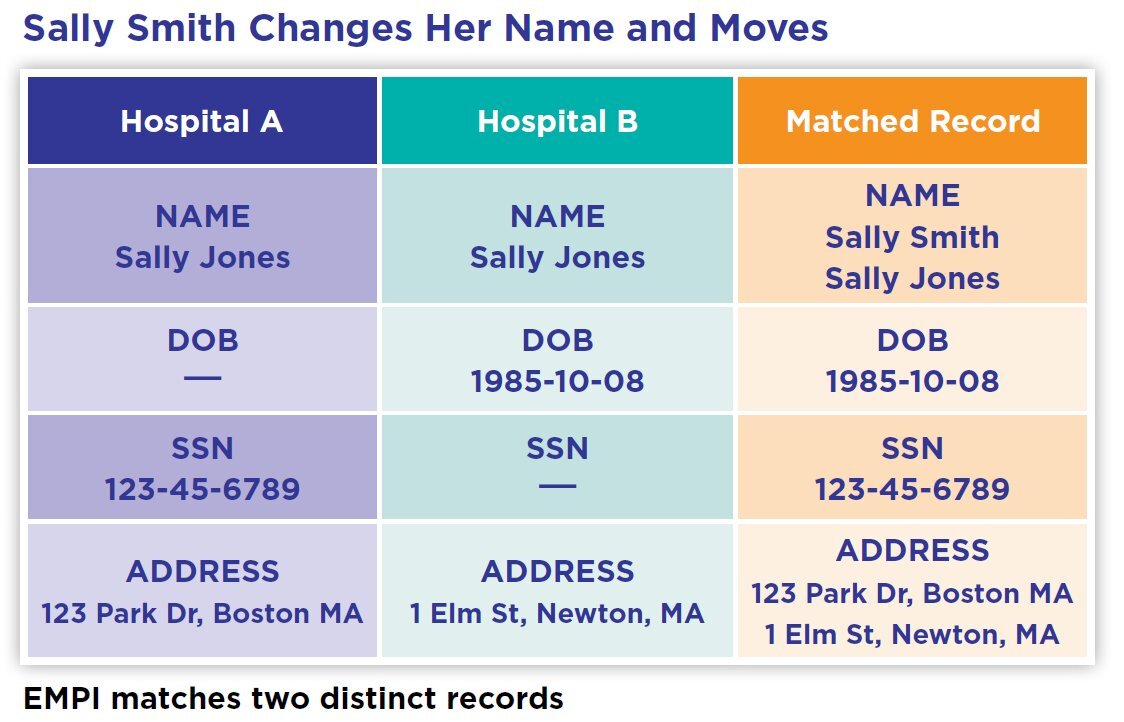High-Quality Data Improves Care Delivery and Business Performance
Digital transformation has revolutionized healthcare, but it has also created significant identity data management challenges for healthcare providers and payers. Most healthcare organizations (HCOs) leverage a diverse collection of clinical and business systems including EHR platforms, pharmacy and lab software, appointment scheduling applications, CRM solutions, and billing and payment tools, each with unique record identifiers.
Reconciling patient and member records across or even within systems is a daunting proposition for many HCOs. Name changes, address updates, formatting discrepancies, spelling mistakes, and other irregularities often lead to duplicates (multiple entries created for the same person) or overlays (data for multiple individuals merged into the same record). In fact, according to an AHIMA survey, up to 20% of all medical records are duplicates.¹
Identity data inconsistencies and gaps can lead to:
- Diminished care quality and patient safety – incorrect patient matching can result in mishaps such as administering the wrong medication to a patient
- Treatment and reimbursement delays – 35% of all denied claims result from inaccurate patient identification or information²
- Negative business consequences – erroneous risk and quality measurement data can undermine value-based care payment models and impact the bottom line
- Excess expenses for providers, payers, and patients – the average cost of repeated medical care because of duplicate records is $1,950 per inpatient and over $1,700 per ED visit²
- Inaccurate AI models – clean and accurate identity data is essential for predictive analytics, personalized medicine, intelligent clinical decision support solutions, prior authorization claims analysis, and other AI initiatives
- Costly regulatory fines and legal settlements – from accidental disclosure of health information to the wrong patient to sharing the wrong information in fulfillment of interoperability mandates
- Lost IT productivity – IT organizations can squander time and resources manually cleaning data and de-duplicating records
Research VP, Gartner4
EMPIs Eliminate Identity Data Gaps, Inconsistencies, and Inefficiencies
Enterprise master person index³ (EMPI) solutions help HCOs reconcile patient and member records across disparate systems. EMPIs match and link records from various sources, providing a uniform, uniquely identified record for each person. They are critical for high-trust industries such as healthcare where making the right match is essential. They are also critical for data analytics and AI applications, which rely on clean and accurate identity information.

EMPIs help organizations improve care quality and business performance by eliminating duplicate and overlaid records and reducing mistakes and inefficiencies. They provide a single source of truth for identity data that is accurate, complete, and current. HCOs can use EMPIs to improve data quality and governance, comply with interoperability and information sharing regulations like CMS-0057-F, reduce medical errors, avoid duplicate diagnostic and lab procedures, boost IT productivity, increase data insights, streamline M&A integrations, and much more.
- Improve identity data quality
- Enhance revenue cycle management
- Streamline interoperability and data exchange
- Unlock the full potential of AI
Traditional EMPIs use deterministic and probabilistic matching algorithms to identify and consolidate records belonging to the same person. Deterministic algorithms look for exact matches of specific data elements like name, date of birth, or social security number. If all criteria match, the records are deemed to belong to the same individual.
Probabilistic algorithms use statistical models to determine the likelihood that two records belong to the same person. These algorithms assign a score indicating the probability of a match based on similarities in multiple attributes.
Next-Generation EMPIs support advanced referential matching functionality to enhance identity data accuracy and completeness even further. Referential matching verifies a person’s identity, fills in gaps, and resolves data discrepancies by cross-referencing records with external identity proofing services or authoritative data sources such as government databases, telephone directories, or credit reporting agencies. Referential matching helps ensure records are complete, error-free, and up-to-date.4

Choosing the Right EMPI Solution
Not all EMPI solutions are the same. When evaluating options, look for a solution that offers:
- Comprehensive matching capabilities – supports a variety of algorithms and approaches including referential matching
- Built-in automation tools – lets you match and reconcile records automatically
- A customized rules engine – provides configurable, site-specific logic for matching or alerting
- Robust integration functionality – supports a wide range of systems standards-based APIs (HL7® v2, FHIR®, etc.)
- Flexible deployment models – can be implemented in a public cloud, on-premises, or as a managed service
- Regulatory compliance – adheres to security frameworks like HITRUST and data privacy regulations like HIPAA
Be sure to choose a solution provider with extensive healthcare data and records management experience and expertise.
1 - AHIMA survey of US healthcare industry professionals
2 - Black Book Market Research
3 - Also known as an enterprise master patient index
4 - Innovation Insight for Next-Generation Enterprise Master Patient Index. Gartner. 11 September 2024 - ID G00758255


























